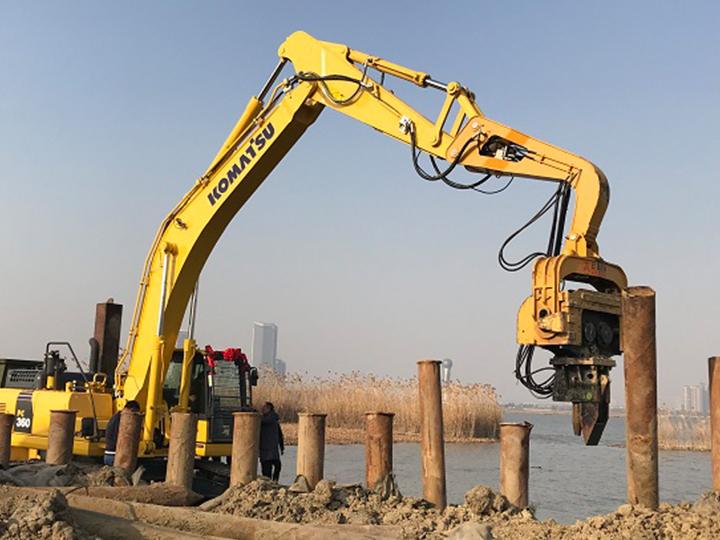Advantages of Using a Vibratory Hammer for Excavator in Construction Projects

In modern construction, speed, efficiency, and accuracy are essential. One of the tools that helps achieve these goals is the vibratory hammer for excavator. This piece of equipment has become increasingly popular because it can handle a wide range of pile driving tasks while being easy to operate when attached to an excavator. Whether the project involves building a bridge, dock, or foundation, a vibratory hammer for excavator can make the work faster and more cost-effective.
In this article, we will explain what a vibratory hammer for excavator is, how it works, and the many advantages it offers in construction projects.
What is a Vibratory Hammer for Excavator?
A vibratory hammer for excavator is a pile driving tool designed to be mounted on an excavator. It works by producing strong vertical vibrations that loosen the soil around a pile, allowing it to be driven into the ground with less resistance. These vibrations also make it easier to extract piles when needed.
Unlike traditional pile driving hammers that rely on heavy impact, a vibratory hammer uses high-frequency vibrations to reduce soil friction. This results in quieter and faster pile installation, making it a preferred choice in many urban and sensitive construction environments.
How Does a Vibratory Hammer for Excavator Work?
The working principle of a vibratory hammer for excavator is based on vibration and pressure. When the hammer is attached to the excavator’s boom, the hydraulic system powers a set of rotating counterweights inside the hammer. These counterweights produce vibrations that transfer directly into the pile.
As the pile vibrates, the surrounding soil particles move slightly apart, creating less resistance. This allows the pile to penetrate the ground quickly. The same process works in reverse for removing piles from the ground.
Advantages of Using a Vibratory Hammer for Excavator in Construction
Using a vibratory hammer for excavator offers several important benefits for construction projects. Let’s look at them in detail.
1. Versatility for Different Pile Types
A vibratory hammer for excavator can be used for a variety of pile types, such as steel sheet piles, H-beams, and timber piles. This versatility means contractors can use the same equipment for different jobs without needing multiple specialized machines.
2. Faster Pile Driving Process
Speed is a major advantage. The vibrations reduce soil resistance significantly, allowing piles to be installed much faster compared to traditional methods. This can save hours or even days on large-scale projects, helping to meet tight deadlines.
3. Reduced Noise Levels
Traditional impact pile drivers can be extremely loud, often causing problems in urban areas or near residential zones. A vibratory hammer for excavator is much quieter, which means it can be used in noise-sensitive locations without disturbing the surrounding environment.
4. Lower Vibration Impact on Surroundings
Although the hammer itself produces strong vibrations in the pile, the effect on the surrounding ground is often less damaging compared to heavy impact methods. This reduces the risk of structural damage to nearby buildings.
5. Cost Savings
Faster installation times and lower fuel consumption contribute to cost savings. Since the vibratory hammer for excavator is an attachment rather than a separate machine, it eliminates the need to buy or rent additional heavy equipment.
6. Ease of Mobility
Because it is mounted on an excavator, the vibratory hammer can be moved quickly from one pile location to another. This mobility is useful for projects where piles need to be installed in multiple positions over a large area.
7. Reduced Operator Fatigue
Operating a vibratory hammer for excavator is less physically demanding compared to manual or older methods. The excavator handles most of the heavy work, allowing the operator to stay comfortable and focused.
8. Environmental Friendliness
By reducing noise and minimizing soil disturbance, the vibratory hammer is a more environmentally friendly option. This is especially important for projects near wildlife habitats or protected areas.
Applications in Construction Projects
A vibratory hammer for excavator can be used in many types of construction work, including:
-
Bridge construction – For driving foundation piles into riverbeds or soft soil.
-
Harbor and dock building – Installing sheet piles to create retaining walls or water barriers.
-
Urban foundation work – Working in tight city spaces where noise and disturbance must be minimized.
-
Temporary structures – Quickly driving and removing piles for temporary shoring or event platforms.
Tips for Getting the Most Out of a Vibratory Hammer for Excavator
To maximize the advantages of a vibratory hammer for excavator, follow these practical tips:
-
Choose the right hammer size – Make sure the hammer’s capacity matches the pile size and soil conditions.
-
Check hydraulic compatibility – The excavator’s hydraulic flow and pressure should be suitable for the hammer.
-
Inspect regularly – Keep the hammer in good condition through regular maintenance to prevent breakdowns.
-
Train operators – Ensure the operator understands the correct techniques for safe and efficient use.
-
Monitor soil conditions – Adjust the vibration settings according to soil type for best results.
Final Thoughts
The vibratory hammer for excavator is a valuable tool in modern construction. It offers speed, versatility, cost savings, and reduced environmental impact. By making pile driving faster and quieter, it helps construction teams work more efficiently and complete projects on time.
- Seo
- Art
- Causes
- Crafts
- Dance
- Drinks
- Film
- Fitness
- Food
- Games
- Gardening
- Health
- Home
- Literature
- Music
- Networking
- Other
- Party
- Religion
- Shopping
- Sports
- Theater
- Wellness
- Business & Money

